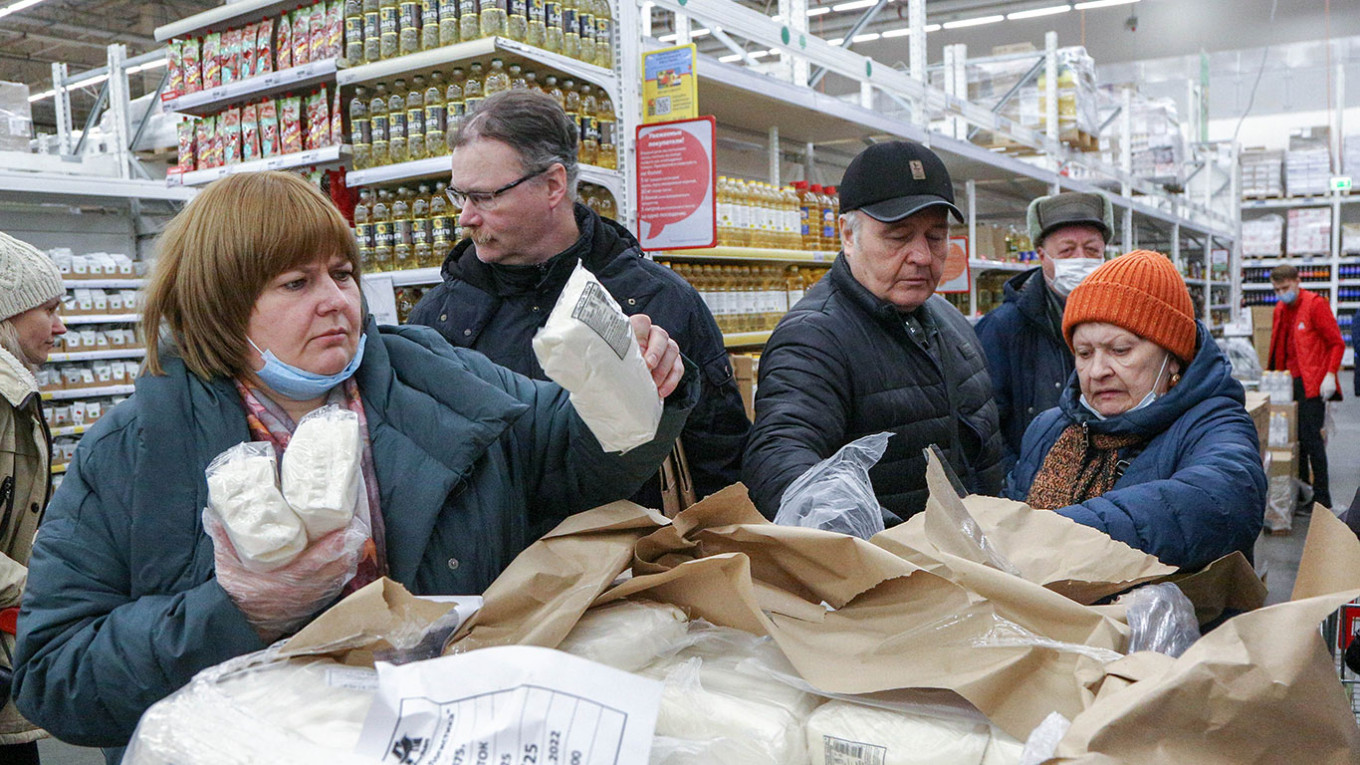“The frenzied demand in the Russian food market has already subsided," Vladimir Putin said the other day.
The Russian president made this announcement after the Russian and foreign media were filled with images of mostly elderly shoppers grabbing up packages of sugar.
To be fair, in this case he wasn’t lying. You don’t see any lines for sugar these days. But how did prosperity descend on our country so suddenly?
The answer is simple. People were buying up sugar and other products while they were cheap. And now the situation has changed: Prices for that same sugar rose by 30-40%. Even the pro-government newspaper Rossiyskaya Gazeta had to admit it.
So frenzied demand smoothly morphed into an inability of the majority of the population to stock up on food or even buy the necessities.
It’s worth remembering that according to Rosstat, the Russian statistical agency, before the war there were about 20 million poor people in the country. In reality, one in four Russian citizens is scrimping to make ends meet.
FinExpertiza, a financial consulting agency, once used internationally accepted methodology to calculate income levels. Their experts found that 24.6 % of the Russian population, or 36 million people, had an income below 60% of the median income. The median income last year was 27,000 rubles (about $300) per month. That means that a quarter of the population lives on the brink of poverty with an income of 16,000 rubles — about $150 — a month.
At the same time price increases are — in the euphemistic words of patriotic Russians — “unparalleled." If it was just the price of sugar, that would be one thing. But in the city of Kurgan, for example, the price of onions has gone up 160%. Compared with March of last year, in Russia as a whole cabbage prices have increased the most among the major essential foodstuffs: they have risen 209.45% — more than threefold. The price of sugar went up by half (56%). Buckwheat is up 37.7%, flour —20.61%, pasta — 21.22%, and almost all fruits and vegetables — onions, tomatoes, carrots and potatoes — went up by more than 20%. Meat and poultry — beef, lamb, pork and chicken — rose in price by 12-19%.
Although the government is making the usual statements about “market mechanisms,” in actual fact they took the most obvious measure. They froze prices.
The Ministry of Industry and Trade announced that they would fix maximum prices for essential goods. This is permitted by legislation, which gives the government the right to freeze prices for up to 90 days if they have risen 10% or more for 60 consecutive days.
In the provinces measures are even more stringent. For example, in Zabaikalsky region, retail chains and the Ministry of Economic Development of the region signed a memorandum to curb the prices of certain food products from March 28. The list of goods includes nine items: milk, refined sunflower oil, sugar, premium and Grade A wheat flour, rice, pasta, salt and bread. Retailers will not be allowed a markup of more than 15% of the selling price.
Under pressure from the authorities, hundreds of stores in cites of the Khabarovsk region have fixed minimal markups on essential goods. In Kuban, they are also trying to keep prices down by administrative means. The list of goods that are 'frozen' include chicken, sunflower oil, milk, kefir, sour cream and cottage cheese, eggs, sugar, salt, flour, bread, and cereals. Last week butter and black tea, as well as some kinds of baby food, were added to the list.
Naturally, the local security forces, afraid they’ll be sent off to fight, are trying to show their value on the home front by drastically stepping up their search for black marketeers and saboteurs. “We must control prices, fix prices where possible, and fight against black marketeers," said Sergei Zakharikhin, head of the local branch of the Federal Security Service in the Krasnodar region.
What will mandatory price cuts lead to? Retail chains will cover their losses from the sale of essential foodstuffs by raising the prices of everything else. The overall result will certainly not favor the consumer.
Another result will be a sharp decline in the quality of essential foodstuffs. This is immediately apparent in bread, now baked from low-quality flour.
In short, this is a typical situation for Putin's Russia, a clear demonstration that the authorities don’t even have any understanding of the situation, let alone a strategy for dealing with it.
A Message from The Moscow Times:
Dear readers,
We are facing unprecedented challenges. Russia's Prosecutor General's Office has designated The Moscow Times as an "undesirable" organization, criminalizing our work and putting our staff at risk of prosecution. This follows our earlier unjust labeling as a "foreign agent."
These actions are direct attempts to silence independent journalism in Russia. The authorities claim our work "discredits the decisions of the Russian leadership." We see things differently: we strive to provide accurate, unbiased reporting on Russia.
We, the journalists of The Moscow Times, refuse to be silenced. But to continue our work, we need your help.
Your support, no matter how small, makes a world of difference. If you can, please support us monthly starting from just $2. It's quick to set up, and every contribution makes a significant impact.
By supporting The Moscow Times, you're defending open, independent journalism in the face of repression. Thank you for standing with us.
Remind me later.








